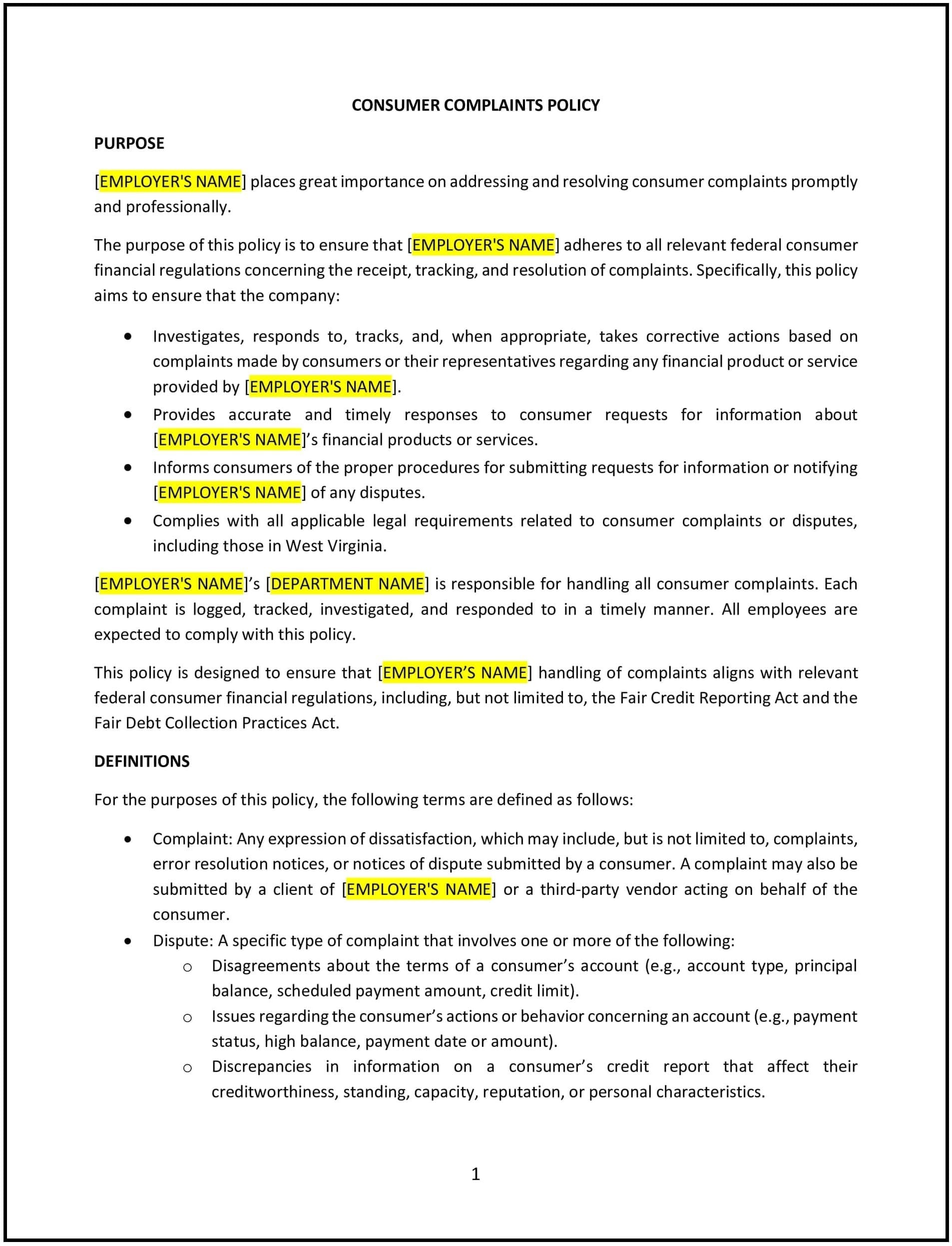Consumer complaints policy (West Virginia): Free template
Got contracts to review? While you're here for policies, let Cobrief make contract review effortless—start your free review now.

Customize this template for free
Consumer complaints policy (West Virginia)
A consumer complaints policy helps West Virginia businesses manage and address customer complaints efficiently and professionally. This policy outlines the process for customers to file complaints, the steps the company will take to investigate and resolve issues, and the commitment to improving customer satisfaction by learning from feedback.
By implementing this policy, businesses can build trust with customers, improve their products or services, and demonstrate their commitment to customer service excellence.
How to use this consumer complaints policy (West Virginia)
- Define the scope of complaints: Clearly outline the types of issues that are considered consumer complaints, such as product defects, service quality, billing errors, or customer service interactions.
- Set up complaint submission channels: Provide clear instructions on how consumers can submit complaints, whether through an online form, email, phone, or in person. Ensure the process is accessible and easy to use for customers.
- Establish complaint handling procedures: Define the steps the company will take once a complaint is received, including acknowledgment of receipt, investigation, resolution, and communication with the consumer. Set timelines for each stage of the process.
- Assign responsibility: Designate a team or individual responsible for handling consumer complaints, ensuring that the team has the authority and resources to resolve issues effectively.
- Promote transparency: Communicate how consumers will be kept informed throughout the complaint resolution process, including updates on the status of their complaint and any actions taken to address their concerns.
- Encourage resolution within a set timeframe: Specify the expected timeframe for resolving complaints, aiming to address issues promptly to maintain consumer trust and satisfaction.
- Track complaints and analyze trends: Keep records of all complaints and analyze patterns to identify recurring issues, allowing the business to address root causes and improve its offerings.
Benefits of using this consumer complaints policy (West Virginia)
This policy offers several benefits for West Virginia businesses:
- Improves customer satisfaction: By handling complaints promptly and professionally, businesses can turn negative experiences into positive ones, fostering long-term customer loyalty.
- Reduces legal risks: A clear process for handling consumer complaints can help avoid escalation to legal disputes or regulatory complaints by addressing issues before they become larger problems.
- Enhances reputation: A company that listens to its customers and addresses complaints transparently is more likely to build a positive reputation and attract new customers.
- Identifies areas for improvement: Analyzing consumer complaints can provide valuable insights into areas where products, services, or processes can be improved, contributing to better overall business performance.
- Promotes accountability: This policy encourages employees to take responsibility for resolving customer issues, ensuring that the company consistently delivers high-quality customer service.
Tips for using this consumer complaints policy (West Virginia)
- Communicate the policy clearly: Ensure that customers are aware of how they can file complaints, where to go for assistance, and the steps the company will take to resolve issues.
- Train employees: Provide training to employees on how to handle complaints professionally and empathetically, focusing on resolution and customer satisfaction.
- Track complaints consistently: Keep detailed records of all complaints and resolutions to identify common issues and evaluate how well the business is meeting customer expectations.
- Monitor complaint trends: Regularly analyze complaint data to uncover patterns or recurring issues that may indicate areas for improvement in products or services.
- Review periodically: Periodically review and update the policy to ensure it aligns with customer expectations, legal requirements, and company practices.